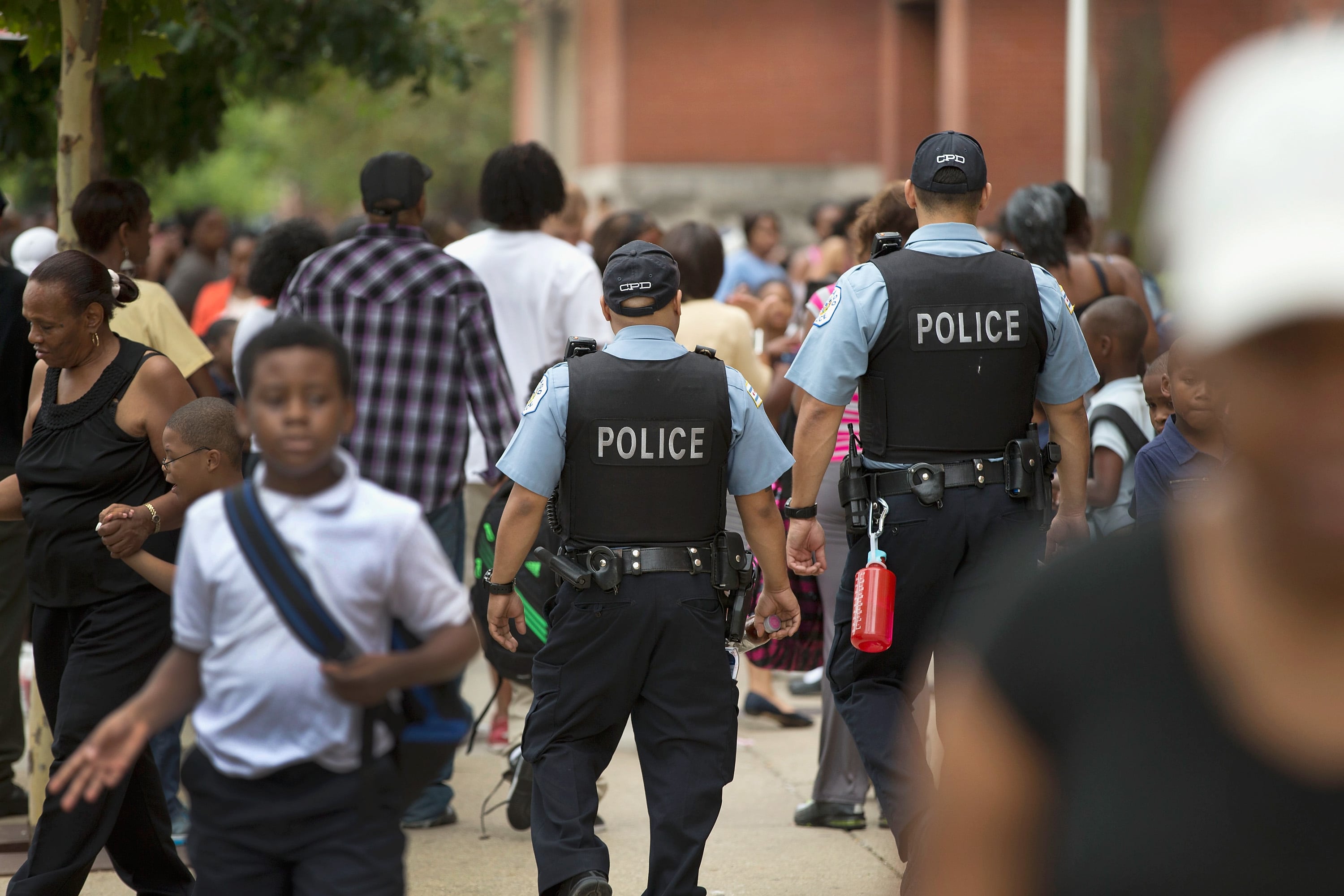One week ago, the demand for police-free schools in Chicago was led by a tireless group of youth advocates and activist teachers who had been hammering away at the issue for years.
This week, they’re joined by an unprecedented chorus of new voices — thousands of marchers who have picked up the demand in recent days, and the Chicago Sun-Times, one of Chicago’s two largest newspapers, that Tuesday published an editorial calling for an end to police in schools.
It’s a sign of the fast-moving public discussion taking place in a moment of unprecedented social upheaval, marked first by a pandemic that shut down schools and workplaces around the world, and then a protest movement against police violence ignited by the police killing of George Floyd in Minneapolis.
As the conversation moves forward, here’s a breakdown of the facts around safety and security in Chicago schools:
This school year Chicago saw the biggest changes to school policing in a decade.
Chicago overhauled its school policing system this school year in response to changes mandated by a federal consent decree. By September, the Chicago Public Schools and the Chicago Police Department were instructed to make a slew of reforms intended to bring clarity, accountability, and safety to school policing.
The district also signed a new $33 million contract with the police department for school police, which will be paid for with money from the school district’s budget. These costs have been volleyed back and forth in recent years; both youth advocates and union officials, who were negotiating their new contract this past fall, have criticized them, saying they drain schools of money that could be spent on other types of aid for students.
Those changes included writing out a clear job description for school officers, mandating that police stay out of any school discipline, and clarifying how officers are hired or fired.
But even as those rules were laid out, they weren’t always clear to teachers and students on the ground. A Chalkbeat examination earlier this year found that the reforms remained a work in progress, six months past the deadline.
As the school year wraps up, some of the details about Chicago’s school police program are still in flux. Police and school officials solicited public comment in May about the directives they’re developing for school officers.
Mayor Lori Lightfoot has said she won’t consider removing police from schools, but has promised new reforms to the police department in the coming weeks, including increased training and a shift in recruitment to bring more officers from communities of color onto the force.
Most school security is provided by security guards, not police officers.
Chicago has more than 500 district-run schools, plus another 118 charter and options schools. School police walk the halls of 72 of the district-run schools, mostly in high schools. Officers in squad cars are also assigned to some elementary schools.
The district’s Office of Safety and Security hires and trains security guards, oversees the Safe Passage program that places guards at strategic points along students’ paths from school, and conducts background checks on school staff and volunteers.
According to Chicago Public Schools employee data for this school year, there were more than 1,400 security officers of different levels. In total, 180 police officers are assigned to Chicago schools.
Discipline varies school by school — but the district has moved toward a restorative approach.
Since 2012, Chicago has taken a districtwide school discipline approach toward restorative justice, and has seen a decrease in suspensions and expulsions as a result. The district saw suspensions and expulsions fall. In the 2018-19 school year, there was a 46% drop in students being referred to police across the district, the head of safety and security said.
In early 2019, Chicago schools downgraded their categorization of students’ use of alcohol and drugs in schools from the most serious type of misconduct to a lesser infraction with milder penalties.
That’s been helped along by efforts like those of State’s Attorney for Cook County, Kim Foxx. She runs a special court that offers juvenile offenders restorative justice options and mediation in lieu of jail time. She also has proposed a diversion program to connect young people arrested in schools with social workers.
At the school level, some buildings have a dean of discipline whose job is to make decisions about enforcing school rules. Others have discipline committees consisting of a group of teachers and a counselor to head off serious misbehavior before it starts.
School communities say they still need more support for a non-punitive discipline approach, such as additional training in restorative justice and more social workers and counselors.
Organizers in Chicago say they have new momentum.
The decision by Minneapolis Public Schools to cut ties with its local police department has galvanized efforts nationwide to remove police from schools. School districts in Portland, St. Paul, and Rochester have taken up the issue in recent weeks.
Meyiya Coleman, a youth organizer with the youth group VOYCE, said the decision in Minneapolis created the perfect moment for organizers to push for their demands. She hopes the school district will end its police contract. “Now is the time,” Coleman said.
Community groups rallied at several schools Saturday and held a virtual discussion to talk about what it would look like to remove police from schools. Another march planned for this week again pushes the demand.
On Tuesday, the editorial board of the Chicago Sun-Times called for an end to school policing. “No child walking through the door should get the unsettling feeling that they’re under the distrustful eye of law enforcement, no matter how friendly Officer Friendly may be,” the paper said.
And Roderick Sawyer, a local alderman whose ward includes the South Side Chatham neighborhood, stood next to young people at a press conference with VOYCE and called for a change to school policing. He promised to bring the issue up in the city council, even as he said that his community wants more officers on the streets.
Still to come this week: a march against school police in Chicago’s Albany Park neighborhood, led by VOYCE.
Chicago Public Schools and the Chicago Police Department have promised continued engagement around the issue.
Mayor Lori Lightfoot said Friday she will not take police out of schools. “We’re not going to do that. Unfortunately, we need security in our schools,” Lightfoot said in a press conference last week. But the school district and police department have pointed school communities to some other ways to engage.
In a statement, Chicago Public Schools said that schools could remove their police officers through their Local School Councils, which last year were given the authority to vote on keeping officers in a school. The district also said the police department would create a school police working group to incorporate statements from the public collected through recent public comment.
“Chicago Public Schools values the feedback we are receiving from students, families, and community members, and we remain committed to continued engagement and dialog about the role of School Resource Officers in our schools,” Chief Security Officer Jadine Chou said in a statement, referring to the sworn police officers on campus.







